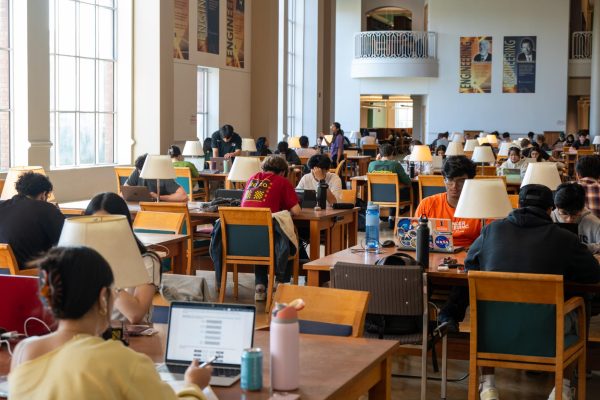Age gaps between students, professors raise concerns
October 26, 2021
As students and professors return to the classroom, interactions between faculty and their pupils have grown in both proximity and frequency. One aspect of the relationship between student and professor that has also been called to attention has been a gap much larger than the six feet of distance we’ve become accustomed to — the age gap.
With the majority of students being in their early 20s and some professors’ ages reaching into the 60s, the age difference between those at the teaching podium and those taking notes can be wide.
Concerns as to whether this range of ages can cause obstacles between teacher and students can be rooted in stereotypes on either side, said Jennifer Cromley, associate professor of cognitive science of teaching and learning.
“Certainly, there are stereotypes about older people and stereotypes about younger people,” Cromley said. “It would not be surprising if younger students stereotyped older professors, and it would not be surprising if older professors stereotyped younger students.”
Cromley said the age gap could also cause a disconnect between professors who have more experience than students.
Get The Daily Illini in your inbox!
“The faculty member has a lot of life experience,” Cromley said. “It’s not just about having a Ph.D., it’s about having lived a bunch of life. And students have different experiences and less of a sort of big picture of the world. And you could see big disconnects.”
Those disconnects may be less common in the relationships between teaching assistants and students. Generally, TAs are closer in age to students than most professors.
Trevor Brooks, freshman in LAS, said TAs have been easier to connect with than professors.
“Compared to my professors who aren’t closer to my age, I feel like we’re able to form a better relationship and have more similar experiences,” Brooks said.
For Sam Neumann, sophomore in LAS, age has not dictated the strength of relationships between professors and their students.
“I don’t think it has too much to do with age,” Neumann said. “I know some professors that are a lot older who keep good relationships with their students and then there are professors who are a lot younger than them who don’t.”
However, one concern students have expressed with the age gap is how it can cause ageism on behalf of professors towards students.
Talia Duffy, freshman in Media, said the disconnect between professors who think of themselves as adults and students as kids can cause problems in building their relationships.
“Adults always think that they have the moral high ground, when in reality, we’re all just people,” Duffy said. “I think it just creates conflict and a lack of trust.”
Hunter White, a TA and graduate student in comparative and world literature, said that the problem lies in how generations view themselves versus how they are viewed by older generations.
“Our generation sees ourselves as adults once we get into college — sometimes even before,” White said. “Whereas for some older generations, they might see us and be like ‘they’re still kids.’”
Seeing students as kids, White said, could lead to professors looking down on their students. This method of teaching can cause issues to arise between professors and students, impacting the learning environment.
“For those professors who do feel like they are almost teaching down in some way, I think it can create problems,” White said.
Cromley said that speaking disrespectfully or condescendingly to students is a way in which professors might destabilize their relationships with students. In doing so, students can become less trusting of the professor, feel more disconnected and have greater difficulty with coursework.
“Obviously, disparaging people is just not a good approach,” Cromley said.
White also said that the tone in which a teacher speaks to students can set the tone for how that student consequently learns.
“If a student feels talked down too, no matter what age, they’re not going to want to learn whatever it is,” White said.
The tone of a class can change how students respond not only to the professor but to the course and class itself. Duffy said that there comes a point where, to her, the class becomes less effective and more condescending when a teacher is speaking down to students.
“It changes it from a class that’s meant to help to a class that’s meant to lecture,” Duffy said.
The age gap, however, should not bar professors from trying to keep up with the changing trends in culture and connecting with students. A quality that White said students will take note of.
“There are certain professors who, even if they’re older, try to keep up with (the culture) and I think that’s noticed by students,” White said.







